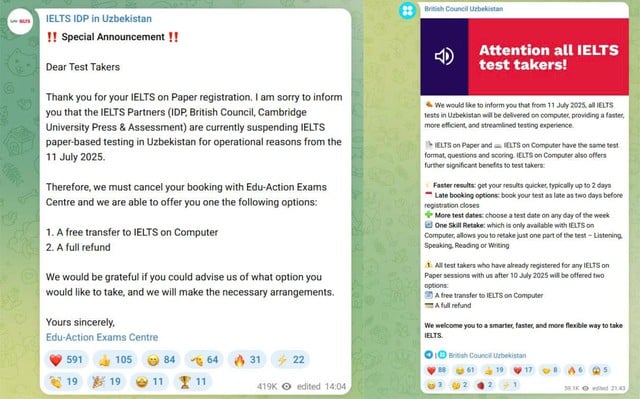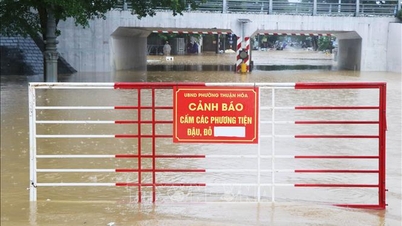
Notice on paper-based IELTS test in Uzbekistan
PHOTO: SCREENSHOT
Uzbek media reported that IELTS test partners Cambridge Assessment English, IDP and the British Council have suspended the paper-based test in the Asian country, starting from July 11. Candidates in Uzbekistan can now only register for the IELTS test on computer, and those who have previously registered for the paper-based test can choose to switch to the computer-based test or request a refund.
According to Gazeta , the decision was announced by Edu-Action, a company that has official IELTS testing centers accredited by IDP in Uzbekistan. Specifically, the announcement on July 8 by this unit said that the IELTS test partners had temporarily suspended the paper-based IELTS test for "operational reasons" but did not specify when this test format would resume.
On the other hand, according to Thanh Nien 's investigation from the British Council in Uzbekistan's official Telegram channel, this unit shared that "all IELTS exams in Uzbekistan will be held on computers" from July 11, not just temporarily suspended. The reason given is to "provide a faster, more efficient and convenient exam experience" for candidates.
Previously, paper-based IELTS test results in early June in this country were sent to Cambridge Assessment English for re-marking and some test results were canceled, according to Gazeta .
In Uzbekistan, IELTS is offered in four cities through IDP and in 12 cities through the British Council. The computer-based IELTS test fee at IDP is $190 and at the British Council is UZS 2,639,000, kun.uz reports.
In Asia, many countries such as Iran, Malaysia, Bangladesh and most recently Vietnam have completely stopped the paper-based IELTS test and switched to computer-based testing. Meanwhile, in Thailand, Indonesia, Japan, South Korea and Singapore, foreigners have been "banned" from registering for the paper-based IELTS test and can only take the test on computer. Most recently, the IELTS test in Hong Kong (China) also applied similar regulations to mainland Chinese candidates.
Speaking to the SCMP in February, a British Council spokesperson said there was a “link between non-residents registering for paper-based IELTS and cheating on test day.” “Allowing only legal residents to register for paper-based IELTS will significantly reduce this risk,” the spokesperson said, adding that this would soon become standard practice in most markets where IELTS is offered.
The British Council also stressed that the above regulation helps to increase the security of the IELTS exam and protect candidates from the "claws" of cheating behaviors.
IELTS (International English Language Testing System) is an international English language testing system recognized by thousands of governments , universities and businesses worldwide. The exam was launched in 1989 and is currently jointly owned by IDP, the British Council and Cambridge Assessment English. According to statistics from test organizers, over 2 million candidates take the IELTS exam worldwide every year.
Source: https://thanhnien.vn/tam-dung-thi-ielts-tren-giay-tai-mot-quoc-gia-chau-a-vi-sao-185250724153959771.htm


![[Photo] President Luong Cuong receives US Secretary of War Pete Hegseth](https://vphoto.vietnam.vn/thumb/1200x675/vietnam/resource/IMAGE/2025/11/02/1762089839868_ndo_br_1-jpg.webp)


![[Photo] Lam Dong: Images of damage after a suspected lake burst in Tuy Phong](https://vphoto.vietnam.vn/thumb/1200x675/vietnam/resource/IMAGE/2025/11/02/1762078736805_8e7f5424f473782d2162-5118-jpg.webp)












![[Video] Expected many special policies on salaries and allowances for teachers](https://vphoto.vietnam.vn/thumb/402x226/vietnam/resource/IMAGE/2025/11/02/1762099443374_luong-dac-thu-cho-giao-vien-3221-jpg.webp)


























































































Comment (0)